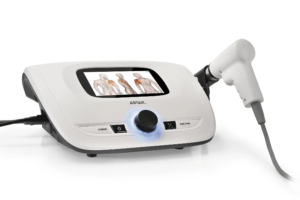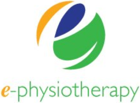Extracorporeal Shock Wave Therapy (ESWT) is a procedure where shockwaves are passed through the skin to the injured tendon or ligament. (Extracorporeal means outside of the body) The shockwaves are mechanical, audible, low-energy sound waves, which are applied to the injured area and stimulate increased blood flow and blood vessels growth. This facilitates healing, cell regeneration, and reduces pain producing substances in the tissues. It is commonly used to treat tendinopathy (tendinitis) and other connective tissue problems like plantar fasciitis. Examples of areas that can be treated are the Achilles, patellar and hip adductor tendinopathies, tennis and golfer’s elbow (lateral & medial epicondylitis), biceps tendinopathy, frozen shoulder, and shin splints (medial tibial stress syndrome).
Shock wave therapy can be uncomfortable or painful, but as the treatment only lasts about three minutes, you should be able to cope with any pain. The intensity of the shock waves can be lowered if needed. After treatment, you may occassionally experience pain, skin irritation, redness, bruising, swelling and numbness. These symptoms should resolve within a couple of days. About half of people receiving shock wave therapy actually feel less pain immediately after the treatment, lasting for days afterwards. At least three treatments a week appart are required for the treatment to be longer lasting. It may take longer than the three treatments, but three is the minimum.
The shockwaves are applied through ultrasound gel or oil with the hand piece of the ESWT machine on the problem area so that the compressed air pulses can transmit through your skin into the injured area.
As there is a small risk of tendon or ligament rupture with shockwave therapy, you should not have this treatment if you have a history of tendon or ligament ruptures. You should not have ESWT if you are pregnant, are taking blood thinning medications other than aspirin (unless with a specific referral from a consultant), have a blood clotting disorder, are under the age of 18, have been diagnosed with bone cancer or are being treated for active cancer, have an infection in the area of treatment, or have had a steroid injection into the affected area in the previous 12 weeks.
You should not take any non-steroidal anti-inflammatory drugs (NSAIDs), such as ibuprofen, for two weeks before your first procedure, and throughout your treatment. Taking anti-inflammatory medication can reduce the effectiveness of ESWT. You may continue to use paracetamol or other pain killers if needed. If you are unsure if any of your medications contain NSAIDs please check with your doctor or pharmacist.
There is no extra charge for shock wave therapy at e-physiotherapy. It is included in the price of a standard physiotherapy treatment when it is indicated. If you want to know if it might be appropriate for your condition please ask the physiotherapist.
Studies have shown ESWT to be effective and the following references are useful systematic review/meta-analysis of the many studies about ESWT.
<strong>References</strong>
Yifei, Fan, Ziyan Feng, Jun Cao, Weili Fu. Orthopaedic Journal of Sports Medicine, Volume 8 (2) 2020. Efficacy of Extracorporeal Shock Wave Therapy for Achilles Tendinopathy: A Meta-Analysis.
<a href=”https://journals.sagepub.com/doi/full/10.1177/2325967120903430″>https://journals.sagepub.com/doi/full/10.1177/2325967120903430</a>
Schmitz C, Császár NB, Milz S, Schieker M, Maffulli N, Rompe JD, Furia JP. British Medical Bulletin 2015, 116(1) 115-138. Efficacy and safety of extracorporeal shock wave therapy for orthopedic conditions: a systematic review on studies listed in the PEDro database
https://www.ncbi.nlm.nih.gov/pmc/articles/PMC4674007/
Abdelkader NA, Helmy MNK, Fayaz NA, Saweeres ESB. Foot & Ankle International 2021 Jan 15. Short- and intermediate-term results of extracorporeal shockwave therapy for noninsertional Achilles tendinopathy.


